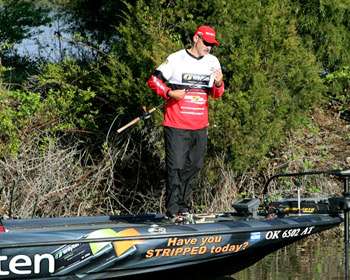
The learning curve associated with a pro's first year as a competitor on the Bassmaster Elite Series circuit is incredibly steep. Beyond the grueling 30,000 miles of travel required between tournament stops is the fact that many rookies are put onto bodies of water they've never seen before.
After his third stop at Alabama's Wheeler Lake, Elite Series rookie Vince Fulks figures he's approximately 40 percent through the learning curve. He points out that while there's still much to learn and discover about competing at the sport's highest level, he and his fellow freshman class have things a lot easier than their predecessors did when visiting new lakes.
"It's a lot easier now than it used to be with the Internet and the access we now have to past tournament results," he explains. "By looking at the tournament results from past events, you're able to determine where the hot spots are on a particular lake." For Fulks, the Internet is where his homework begins, but like most any self-respecting bass angler, high-quality topographical maps are the next stop.
"Once you've gotten the lake broken down to the most productive areas, you're able to get out a topo map of the lake and really drill down to the specifics," he says. "Being from Oklahoma, I'm a 'flip and pitch' sort of guy so I always focus on the river bends that will offer deep water access." As a self-styled "power fisherman," Fulks' priority is to find areas that are conducive to his style of fishing.
"I'll always try to find something that fits my strengths first, then try and move out and establish some alternatives," he reveals. "The key for tournament fishermen is to determine the quality of fish that it will take to win an event. Again, Fulks points out that in order to know the type of weights that'll be required to do well, homework on past tournament results is a must.
From there, he explains, developing secondary areas or patterns will separate the penthouse performers from the basement dwellers. "You want to put yourself around those fish and try to develop techniques that you're confident in," he points out. "But you can't ever discount the possibility that you'll need some back-up water to go to.
Looking at my Dardanelle performance from a few weeks ago, you can see what can happen when your main group of fish changes and you don't have a solid back-up plan." With homework complete prior to arrival at the intended destination, Fulks isolates high-percentage areas based on the season he'll be fishing it. "It really depends on the time of year you're going to be on the lake," he notes. "Take the time of year we're in right now (April) as an example.
"The fish are kind of confused across most of the country trying to figure out if they really want to come to the bank and spawn. You can look at the map, in conjunction with your Internet homework, and find those subtle little staging areas that are near spawning coves and flats before you ever back your boat into the water." With so many variables that are out of a bass fisherman's control while on the water, Fulks believes the objective should be to get a handle on the variables you can control. To him, homework is at the top of the list.
"Believe it or not, there are a lot of guys fishing the Elites who don't do a lot of map work, but it's because they've visited the lakes so much that they're very familiar with them," he says. "For me, that's not an option. I really have to study the map to narrow down productive areas and try to lock into something." As a rookie, he said that as soon as he received his invitation to fish the 2009 Elite Series season, his homework began; however, a lesson for every bass angler or aspiring pro is to keep an open mind. "With today's technology, you can definitely narrow things down pretty quickly," he says.
"It's really beneficial for anglers visiting a new lake for the first time, or a lake that they don't visit too often or have had poor finishes on in the past, to be open-minded and versatile as they try to find something productive. That, as much as anything else, will open up a lot of alternatives."
(Provided by Z3 Media)




